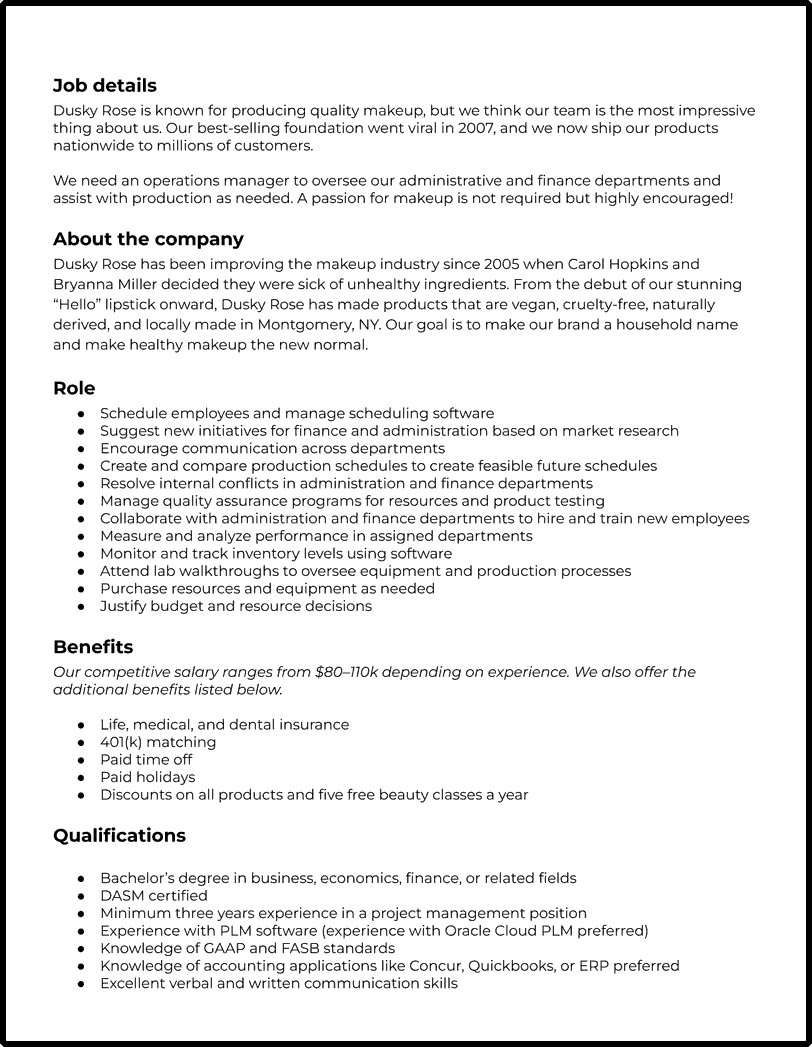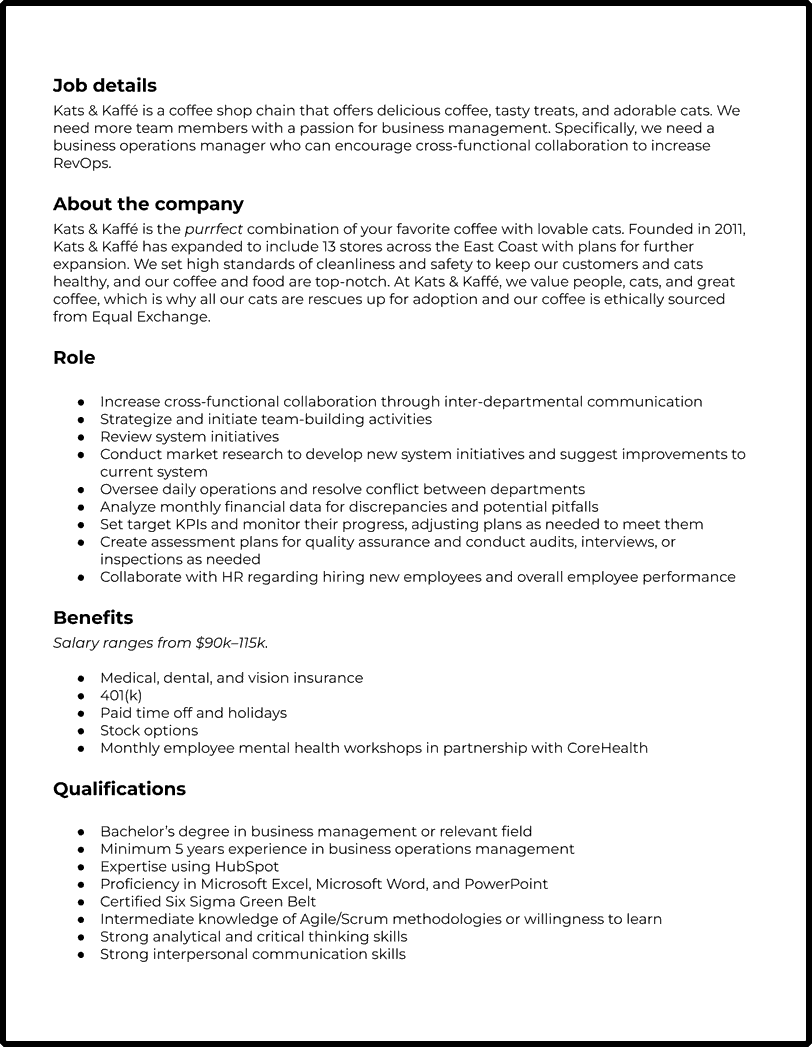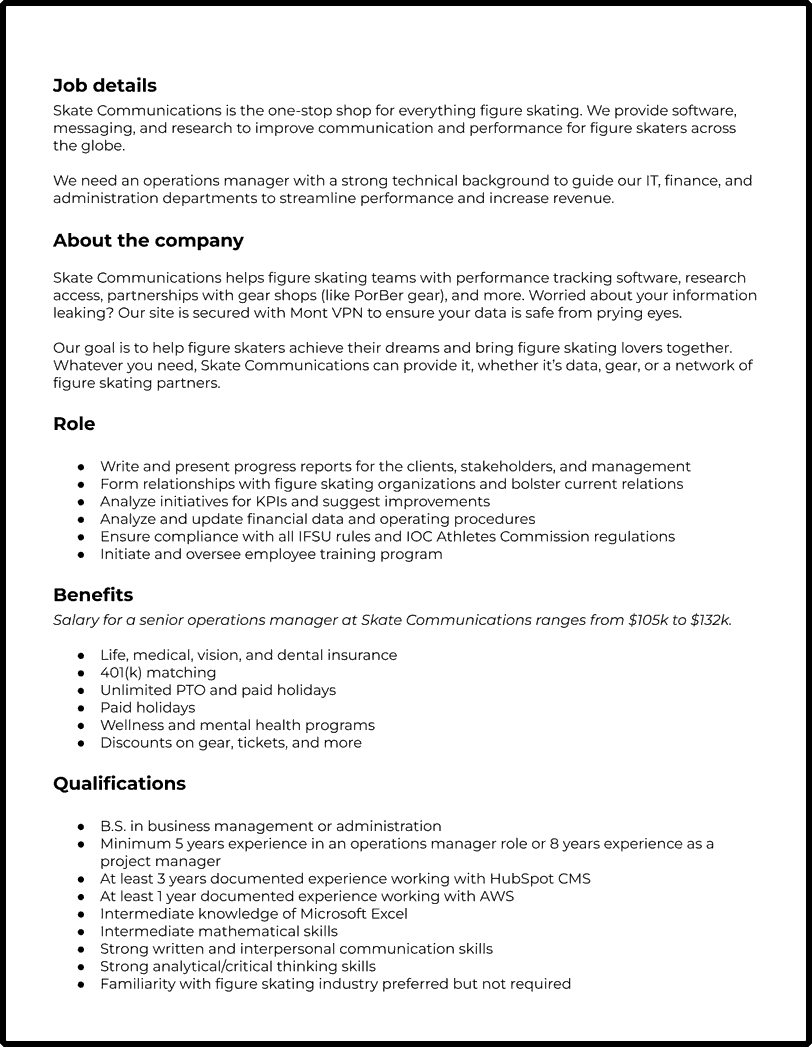If you’re on the lookout for an operations manager who’s a great leader, analyst, and administrator who can juggle business relations, balance budgets, strategize initiatives, and train new employees, we’d love to help!
First off, we advise against the cookie-cutter job descriptions of days gone by. Just like you want operations manager resumes that hold your interest, your job description should do the same.
Because these pros handle so much, writing an operations manager job description can be tricky. That’s why we’ve written this guide to help you attract and hire the best employee for your company—before you know it, you’ll have some excellent operations manager cover letters and resumes landing in your inbox.
Why this job description works
- Most people think that applicants should be the first ones to demonstrate their worth, but you should also do the same for your company.
- If your business earned an impressive award or created an innovative new product that exploded in popularity, then mention it early on. Putting your best foot forward invites candidates to do the same in their operations manager resumes.
- Great managerial candidates should be writing resumes with active language, so you can help them out by setting a good example in how you word your operations manager job description.
- Write your job description with words that shout “Go-getter!” like “resolve,” “manage,” and “lead.”
Why this job description works
- Even in a fun setting with plenty of room for quirky personalities, the job must go on! So, make sure you clearly outline the complexities of the role in your business operations manager job description.
- Lay out details like department size, who your new hire will collaborate with, and how data-focused the role is.
- Don’t forget to mention specific software you use under your qualifications, too!
- If your salary for a role isn’t a set amount but a range that depends upon your new hire’s qualifications, then state this clearly.
- Demonstrating the “tier” of the job lets applicants reciprocate with an ideal resume format for their business operations manager resume. You can learn a lot about a candidate based on what they pick!
Why this job description works
- When writing your senior operations manager job description, be as clear as possible about your requirements.
- Instead of simply mentioning key programs, state how many years of experience your new hire should have with your preferred software.
- Always call attention to any unusual regulations or organizational standards (like IFSU rules) that will require compliance within the job role, too.
- When you have some extra cool benefits to offer your employees, like discount tickets for figure skating performances, don’t hesitate to mention them! On top of the novelty, they’ll provide added context for the work environment.
- Pointing out unusual perks that make your company special may motivate your ideal candidate to mention resume-worthy hobbies or interests that set them apart—which you’d otherwise have missed!
Operations Manager Job Description: How to Write Yours

It’s easy for the average person to view job descriptions like posters hanging up on the wall: easy to make, easy to put up, and great for garnering attention. However, writing job descriptions isn’t as simple as they may appear to outside viewers, and it’s not just views and attention you want. Your job description must encourage applicants to apply and submit operations manager resumes tailored to the specific role.
Most businesses don’t spend time on their job descriptions because it’s too complicated or they have more pressing things to do. Others are desperate for employees, so they just want their descriptions up quickly. All of these reasons are valid, but they’re not sustainable in the long run.
According to the U.S. Bureau of Labor Statistics, most unemployed people spent over three months (15 weeks) looking for a job. That means if job applicants even view just one job description a day, they will see over 100 job descriptions before they are hired. If your job description isn’t enticing, it’s likely applicants will skip over you.
Operations managers especially need well-written job descriptions. They are expert communicators and can read between the lines to see the bigger picture. They can also spot filler text and exaggerations quickly. Wording your operations manager job description carefully is crucial.
Don’t make the mistake, though, of assuming a laundry list of detailed qualifications will remedy this problem. Adding too many qualifiers turns away many talented workers, most frequently women. According to Harvard Business Review, women tend to only apply to jobs when they meet 100 percent of qualifications whereas men apply for jobs when they meet only 60 percent of qualifications.
Wordage is also important. Research published in the Journal of Personality and Social Psychology shows that typically masculine words, including but not limited to “active,” “lead,” and “intellect,” deterred women from applying as they felt they did not fit the qualifications.
To keep your job description from falling into this trap, review your word choice. Forbes also recommends having employees of different backgrounds, genders, and races review your job posting. Keep only what you need.
Reviewing word choice isn’t your final task, though. All writing is improved by revision, including your operations manager job description. Once you’ve revised, take a break. Mistakes are harder to spot when the writer is familiar with the work. Instead, have someone else give it a once-over to spot any issues.
Lastly, even though Grammarly and autocorrect are a huge help, they can’t find everything. Scan the document yourself to catch grammar errors, typos, and minor content mistakes.
It’s also important to check the format of the job listing before you click submit. Many job descriptions are nearly unreadable because of formatting errors.
Overall, when writing an operations manager job description, keep it brief and focused. Choose your words carefully and be understanding of what you require from the applicants. Nobody’s perfect, but lots of people can become just what you’re looking for with a bit of training.
The Operations Manager Job Description Outline

It’s hard to know where to start when writing a job description; follow this outline to get you started.

Job details
This doesn’t have to be titled “job details,” but it should always serve as a sort of introduction to the job. Summarize what your operations manager will be doing in a sentence or two. Remember to include why you’re hiring an operations manager. You can also add a sentence or two about your company, but limit it to two sentences. Readers want to get onto other things and will skip anything too long.

About the company
Many companies have this section first, but many readers will skip it until they know whether or not they want to apply. Regardless of where it is placed, this section is essential once applicants decide to apply. Here is where they’ll learn about your company, the company culture, and what problems you solve. Operations managers especially need to know about the company’s mission and values, so keep this section focused on those elements rather than company history.

What you’ll be doing
Whatever this section is called, make sure it’s easy to read and understandable. Applicants need to know what they’ll be doing on the job before they apply. If this section is hard to read or understand, it could cost you applications.
Also, make sure to be specific about tasks. Operations managers assume they will be overseeing production and communicating with stakeholders, but what makes this role different from other operations manager positions? Choose words with care and use active verbs.
- Present report data to a variety of audience members, including the general public, clients, stakeholders, and management
- Analyze initiatives for KPIs and suggest improvements
- Conduct market research to develop new system initiatives and suggest improvements to current system

Qualifications
Here is where many businesses think they can outline their perfect applicant. As mentioned previously, this tactic is not appealing on multiple levels. Keep this section as brief as possible and in a bulleted list.
Many operations managers require similar experience, so they likely will scan this part. That means you’ll need to make sure any unique requirements are obvious and easy to spot. Include education, experience, and specialization requirements. Soft skills such as organization and detail-focused are applicable but don’t overuse them.
- Bachelor’s degree in business, economics, finance, or a related field
- At least a year of documented experience working with HubSpot CMS
- Proficiency in Microsoft Excel, Microsoft Word, and PowerPoint
- Strong interpersonal communication skills
- Strong analytical/critical thinking skills

Benefits
Most operations manager roles have similar daily responsibilities, so a benefits section will help your company stand out. As with everything, be specific with what you offer, but don’t fall into the trap of adding too much. Highlight the big things like insurance or 401(k) matching. You should also include a salary range if you can, as it indicates honesty and relieves anxiety for applicants. Having it as a range allows room for negotiation based on experience.
Functions and Roles of an Operations Manager

Operations managers are professional jugglers. They must smooth out any rough patches across departments so they’re familiar with executive leadership, finances, HR, and IT. Although operations manager roles differ based on company size and type, they share similar roles from business to business. Some sample roles, responsibilities, and qualifications are listed below. Not all operations managers will fulfill all these responsibilities, but they’re solid examples of what to expect.

Leader
- All managers must be leaders, and an operations manager must be even more so. Since they deal with so many departments, they must be able to work with many teams and be personable and capable of leading many types of people. Knowledge of Agile or other project management methodologies is extremely useful, which is why it’s listed below, but it may not be required.
- Authorize the use of additional resources or budget, input changes based on employee feedback, evaluate employee performance, initiate corrective measures as needed, communicate plan/schedules/company vision/company values with staff, and present data to stakeholders, management, and the general public as needed.
- This role will require intermediate knowledge of Agile methodologies (or a willingness to learn quickly) and strong interpersonal and written communication skills. Must also have a personable demeanor and driven attitude to initiate change.

Analyst
- Whether it’s financial data or technological issues, operations managers are often called upon to examine detailed problems. They must be able to keep track of many moving parts and determine what is causing the issues.
- Collect data on and measure effectiveness/efficiency of current production processes, pinpoint weak areas in processes, and advise management on future strategies to avoid problems.
- This role will require a strong attention to detail and critical thinking skills with an ability to handle multiple projects at once.

Administrator
- Since operations managers have to review the overall functioning of a company, they’re going to run into dealing with lots of paperwork. Reports, reviews, and presentations are all a daily part of an operations manager’s job, so it’s important they are strong communicators both via the written word and verbally.
- Review documentation, write progress reports for multiple departments, organize data, and communicate findings to applicable department staff.
- This role will require someone who is highly organized and detail-driven with the ability to switch projects quickly and review high volumes of documents daily. Must have strong written communication skills.

Technician
- Operations managers oversee company functions, so they must have an understanding of the technology the company uses daily. They must also plan further improvements to current systems, so they must have intermediate technology skills to troubleshoot problems and strategize how to improve. Since they also manage multiple teams, knowledge of project management software is a must.
- Oversee IT department daily operations and collaborate with the team to solve company technology concerns, strategize further technical improvements, patch operating systems, install and update virus protection, answer client and stakeholder questions, and suggest improvements to network security.
- This role will require strong technical competence, with experience using JIRA or Microsoft Project and intermediate experience with Microsoft Excel.

Visionary
- Operations managers oversee daily work and solve problems, but a huge part of their job is looking to the future. Excellent operations managers see how a company runs and can plot a course for change that improves company functioning; it’s why the word “efficient” pops up a lot in operations manager job descriptions. Operations managers must constantly seek improvements for the company in multiple areas, making it one of the harder parts of the job.
- Strategize future initiatives for company growth, identify time-wasters in administrative and financial departments through collaboration with staff, communicate employee feedback with relevant staff, and plan long-term changes to processes based on current high-level issues.
- This role will require strong critical thinking and analytical skills. Will also require strong written and interpersonal communication skills.

Onboarding expert
- Since operations managers oversee the overall functioning of a company, it stands to reason they’re involved in the hiring process to understand who the company is adding. New employees will soon be under the wing of the operations manager, too, so it’s important that operations managers are involved in the onboarding process and take it seriously.
- Assist the HR department with hiring employees, and improve onboarding processes by updating documentation and establishing pre-boarding processes, including creating a welcome team, establishing orientation practices, and crafting new hire schedules.
- This role will require strong interpersonal communication and critical thinking skills. Must have a personable demeanor and a commitment to company values and mission.

Compliance officer
- If there’s a problem, operations managers are going to hear about it, so it’s a good idea to know exactly what problems could arise before they ever become an issue. Previous knowledge of relevant laws and regulations will make being an operations manager much easier. One way or another, operations managers will hear about many rules businesses have to follow.
- Provide legal advice for new initiatives, review standards of compliance for government, health, and business entities, conduct internal audits, train new hires in applicable regulations and ethical dilemmas, and evaluate current practices regarding legal compliance.
- This role will require intermediate knowledge of OSHA and HIPAA regulations with a willingness to learn SOX and GLBA regulations. Must also know state and federal business laws.








